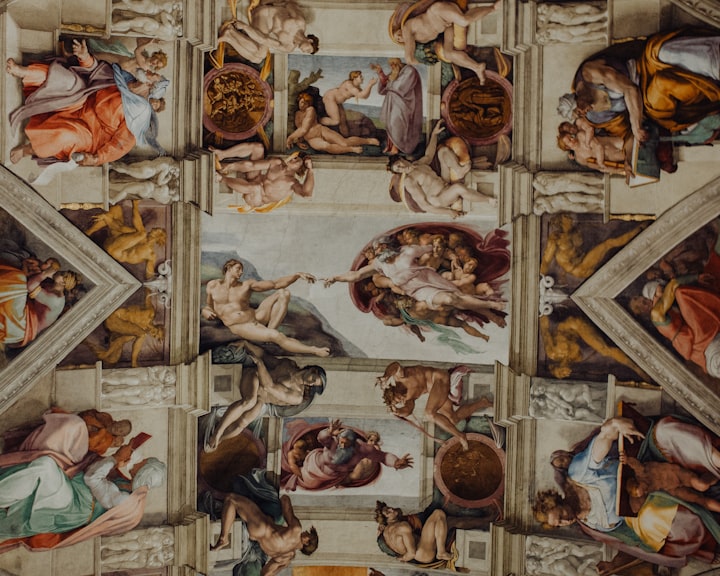Analyzing Lilith
Authors Book Review

I haven’t visited my blog in a while. In fact, I’ve been off my writing game for weeks. Less than mediocre book sales and current events have been very depressing and distracting. It seems my creativity and my opinion do not operate well together and I won’t tarnish my blog with political opinion. This is all about writing.
Then today I woke to a new review of my horror anthology Lil's Spirits: This Side of the Veil, my first in a planned series. It was a 4-Star review, and the reader did say the writing was “very good” and I had “quite the imagination,” but it was almost a backhanded compliment considering everything else she said – needed “more introduction,” “too much cursing,” no backstory. Naturally, I reacted as mature and professional as always – I got pissed off and tried to figure out how to pull the review. Eventually, I calmed down and thought maybe I should use this marginal review as a learning point. Perhaps there is something I could do better, maybe an extended prologue. Would cited reference material help? I studied for several minutes wondering if there was anything I could have done to avoid that less than positive review...
"Nah! The reader is obviously just stupid," I finally decided.
Okay, I may have thought that initially, but truly, I don’t believe this reader is stupid – perhaps ignorant and a bit lazy, but not stupid.
Clearly, my first instalment of Lil’s Spirits was not the right fit for Jessica – her last name I’ll keep to myself though anyone can see the review on the book’s Amazon page. I want to be clear though, I’m not talking about my wife whose name is also Jessica.
As a member, same as me, of a club of writers and book lovers that read and share reviews, Jessica selected Lil’s Spirits and then had to write a review on it. Compelled to rate high, she took the opportunity to pick apart the book in the review text. Her review, titled with the single word “Huh,” is here in full.
Not sure how to review this one. I think there should have been more of an introduction of Lilith. She is not particularly familiar to the Christian world, but obviously, she is one we could do without, since we already have lots of bad guys. I think the writing is very good and the author has quite the imagination. A bit too much cursing without getting a real hold on the back story of how clever, evil, or foolish Lilith is. Does she have an Achilles heel? I am giving this 4 stars to be generous.
I certainly appreciate her generosity – insert face-palm emoji here.
I truly do want to thank Jessica – again, not my wife – here though as she has encouraged me to discuss my book, and why I chose Lilith as my antihero, but as I do that, I would like to address some of Jessica’s concerns.
A Case for Introduction
As a Christian myself, I can agree that Lilith isn’t particularly familiar to the Christian world because her story was left behind in Jewish folklore and Mesopotamian mythology, but she has made many appearances in pop culture that most simply overlook. More importantly however, is that this is a work of fiction and whether I believe that Lilith was made from the same dirt as Adam and torments the modern world is wholly irrelevant. I’m not trying to alter beliefs or write modern scripture; I’m simply spinning a good yarn using an extra-biblical character that I like to write. There is no more reason for me to “introduce” Lilith to the “Christian world” allegedly unfamiliar with her, than there would be for Stephen King to introduce Pennywise to the Hindu World because they aren’t used to seeing an orange-haired Bozo’s with a mouth as wide as a great white and three times as many teeth running around in public.

I too read plenty of books found on the group site I mentioned above and post reviews as my way of giving back and also to earn more reviews for my books, but I’m honest and do my best to understand the writer's intentions. It pains me to hear people say that fiction is a waste of time, that the reader can’t learn from it. I love to learn from fiction. About a month ago, I finished a very enjoyable psychological horror novella about a struggling writer who met a beautiful Greek woman named Calliope. He mentions to the woman that her name is the same as Homer’s muse for which she was aware. As I watch Calliope develop into the antagonist of the story, I’m also perusing pages of information about Homer’s fabled Calliope. I easily could have just accepted that Calliope was a fictional character of the writer’s imagination, but I took the extra step to learn Calliope’s back story.
Even with a desire for knowledge, often the reader is left to accept that the characters of great fiction are just the writer's dreams embodied by the writer's words and the message learned comes from their story. We never learned the backstory of the Wicked Witch of the West, nor even her name, until Gregory Maguire wrote her Life and Times in Wicked 100 years after L. Frank Baum made her the principal antagonist in The Wonderful Wizard of Oz. In Maguire’s story of Elphaba, created by the phonetic pronunciation of Baum's initials L.F.B., we learn what truly makes the witch wicked, and that works for Maguire and as a Broadway musical, but never forget Baum never thought it necessary to explain her history. It was good enough that we knew her intentions.
With that said however, it is important to note that Lil’s Spirits: This Side of the Veil does have an introduction where I clearly explain Lilith’s origin, how I came to know her and how I started writing short stories with her character before I knew who she was. The book includes a prologue that explains how she came to have a liquor store in the Appalachians and the first two short stories of the anthology further describe her relationship, or lack thereof, with Samael – aka Satan in case you missed it – her extrication from the Garden of Eden and finally her dedication to corrupt God’s most beloved creation, Mankind, until the end of her days. I can’t help but think what more could I have done to demonstrate Lilith’s backstory without making it a documentary. Even A Place of Rest, the novella and principal story of the anthology, is titled after Isaiah 34:14 long disputed among theologians as the only place where Lilith is ever mentioned in the canonized Bible.
“The wild beasts of the desert shall also meet with the wild beasts of the isle, and the satyr shall cry to his fellow; the screech-owl (or night hag, or night creature translated from lilit) also shall rest there, and find for herself a place of rest.” Isaiah 34:14 is literally the foundation for A Place of Rest. Jacob, my protagonist and a young pastor trying to save his wife from a manipulative entity, even repeats the verse in chapter three titled The Ish. Coincidentally, Lilith’s attestation to be the Ish, or the last remaining whole, and her allegation that Jacob is a “half with two faces,” is yet another hint about who she is. I fully realize that most people have no knowledge of the Ish but I intentionally injected that opportunity for self-discovery knowing full well that the plot and culmination of the story would not suffer if the reader chose to overlook it. I personally enjoy a little literary treasure hunt when reading a good story, but I acknowledge that it isn’t for everyone.
Hint: There are many convoluted and wholly unrelated definitions of ish. To understand more about what the Ish means in this story, search for the Hebrew meaning or the comparison of Ish and Isha. I've included one link above to point the reader in the right direction.
Telling the Right Story and Using the Right Words
I particularly find the comment about “too much cursing” laughable as I’ve heard it before, but I’m actually offended by the annexation of “without getting a real hold on the back story...” as if my alleged shortfall is a direct result of an alleged indulgence. I take great pride in avoiding gratuitous sex, language, blood or gore in my writing. However, just how does one speak to a tormentor when all the known world has been upturned, a loved one lies on the brink of death and lost salvation and sin has been embraced and the consequences realized? To caveat, Lilith doesn’t care so much about offending someone’s delicate sensibilities, she was once the Queen of Hell; Annie Wilkes she is not. How serious could the reader take Lilith if in the course of scolding Jacob she called him a “cockadoodie sinner?” Just doesn’t carry the feel of a 10s-of-millennia-old vengeful entity.
Finally, reviewer Jessica asked the question, “does (Lilith) have an Achilles heel?” I thought about that question at length and wondered why it had any relevance. Would Nightmare on Elm Street have been such a successful franchise if Wes Craven had revealed how to defeat Freddy Krueger early in the first movie? Hell, it’s been 40 years and we still can’t successfully kill Michael Myers.

In all truthfulness, while avoiding spoilers however, I actually do reveal Lilith’s vulnerabilities, again in A Place of Rest, and I don’t at all regret it even though I intend for the series to live on for as long as I’m able. I don’t regret it because most of the characters that interact with Lilith will not be able to carry or successfully wield the secret weapon because their hearts are too weighted with hate, anger and fear. Love and forgiveness are concepts by which Lilith can simply not abide. It is this that despite the foul language, the sexual situations and even allusions of blasphemy that lead me to believe Lil’s Spirits is Christian literature though I would hardly attempt to convey that to Christian publishers, so I’ll just stay outside the genre like a rebel.
In the first decade of the 16th century, Michelangelo, a devote Catholic, began painting the ceiling in the famed Sistine Chapel in the heart of Vatican City. His more than 300 figures, commissioned by Pope Julius II, that took him four years to paint, depict the doctrine of the Catholic Church going back to creation. Near the center of the great vaulted plafond, and only one panel away from the world-famous Creation of Adam is his painting Temptation and Fall. The two-part image illustrates Adam and Eve giving in to the original sin and then their extrication from the Garden. At the center of the image is the Tree of Knowledge. Holding fast to that tree by a great serpent tail and offering Eve the forbidden fruit is the naked upper torso of a redheaded woman, Lilith.

I grew up in an old fashioned Southern Christian family and I never heard of Lilith until 2008 from my good friend and brigade chaplain during a late-night theological discussion near Baghdad, Iraq. It was at that moment that the face of a recurring character in my imagined stories had a name. Immediately upon hearing that Lilith was the mythical first wife of Adam, banished from Eden because she refused to be submissive to her husband, I suspected she would have a motive to conspire Adam and Eve’s dismissal from God’s Garden. I imagined she was the snake that tempted Eve and thought myself blasphemous for even suggesting such a thing. Imagine my surprise when months later my research unveiled the discovery that Lilith as the serpent was a widely held theory among theologians. I wrote Out of Eden: A Story from the Beginning as my account of The Fall with no intention of publishing it. It was to be for my personal reference only so not to offend or enrage the Christian elite, but learning of Michelangelo's fresco on the ceiling of the residency of the leader of the Holy Roman Catholic Church, I decided my story too was a panel of Christian art. Out of Eden is the second story in the anthology, Lil’s Spirits: This Side of the Veil and is Lilith’s backstory from The Beginning.
From Beginning to End
I don’t see Lilith as evil. She is fueled by evil things such as vengeance, rage and hate, and she is committed to tempting Mankind away from salvation, but she is a victim. She is scorned, lost and alone and she acts badly on it. She is the antihero, neither protagonist nor antagonist though she may at any time display the traits of either or both. She inspires fear, lust, anger and hatred to manipulate but she is not a friend of her former consort Samael, the archangel cast out of heaven for rebelling against God. Samael manipulated her once as well when she was at her most vulnerable and tender moment. She trusted him, and for that, he used her to send man and woman out of the graces of God and into a flawed mortal life.
Of course, after my description of her, most would respond that Lilith is evil, and I would not argue except to say that so are we. We are fatally flawed beings. Not that God created us that way, but after freewill, we corrupted the vessel. God created Man in his image then we amended the creation to our own image. We are not so different from Lilith when we fill our hearts with fear, hate and anger and cultivate it throughout the world chaining our souls to Earth’s bitter fate, but when we purge our hearts of these wicked emotions, we set our souls aloft, lifted by love and forgiveness.
That is what I hope readers will learn from Lilith and I hope they are entertained in the process. Whether Lil’s Spirits is ever accepted in Christian circles, I am indifferent, but if I inspire some readers to self-discovery and in the process they read a little scripture, then I’ve done my part.
Again, I want to thank the reader Jessica for her review though it doesn’t seem appropriately connected to Lil’s Spirits: This Side of the Veil. Regardless, it has compelled me to speak more about it, which I hope will drive interest.
Thanks for reading.
About the Creator
The Bantering Welshman
M.S. Humphreys is The Bantering Welshman, an East Tennessee native, author, journalist, storyteller, marketing specialist, husband and step father. https://www.instagram.com/thebanteringwelshman/ and http://www.banteringwelshman.com






Comments
There are no comments for this story
Be the first to respond and start the conversation.